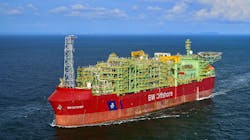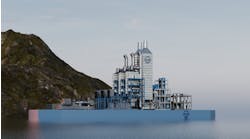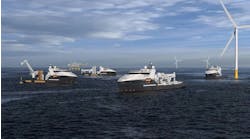Editor's note: This case study article first appeared in the March-April 2023 issue of Offshore magazine's Energy Transformation Strategies Special Report.
By Carol Johnston, IFS, and Fritz Ekløff, BW Offshore
Balancing an uncertain global economy and the increase in market volatility, along with the everyday stress of operating a successful global offshore floating production service is no easy feat. Companies need 24/7 visibility, whether this be the condition or status of onshore/offshore assets or a view into business-critical data. Only when this overall visibility is achieved can oil and gas companies keep operations optimized, revenues maximized and their competitive advantage unmatched; and only enterprise software can cover all the bases.
BW Offshore, a provider of floating production services to the oil and gas industry, has been using IFS software to overcome global economic unpredictability by optimizing operational efficiency, uptime and maintenance.
Technology is playing a huge role in the oil and gas sector’s energy transformation. To remain competitive in what is still an extremely volatile market, oil and gas companies are striving to transform their operations. This transformation is conducted through improving the reliability and availability of their assets while reducing costs and carbon emissions and managing market volatility.
ERP software capabilities
BW Offshore is a diversified offshore energy company with a fleet of 10 FPSO units across the Americas, Asia-Pacific, Europe and West Africa. The company’s organizational infrastructure is complex and requires around-the-clock visibility into all offshore and onshore activities—and this is where enterprise resource planning (ERP) software comes into its own. Using IFS software, BW Offshore has optimized and streamlined its operations and management of its environment. The company now uses a range of IFS modules, including global finance, supply chain, projects, maintenance, inventory, human resource management, maintenance (for vessels) and document management.
BW Offshore recognized that full visibility into its onshore and offshore operations would be a better way to gain better control of its projects and costs and improve its ability to react quickly and efficiently to market changes. The company’s most recent deployment of IFS software has enabled the company to run on a global scale—spanning projects and services employing 1,700 users across 13 countries.
Solving visibility issues
To keep operations running smoothly, BW Offshore needed a comprehensive technology infrastructure to match its complex ecosystem, which includes 70 companies managing significant projects—of up to 1$ billion—and thousands of suppliers. To ensure data continuity and stability, BW Offshore opted to integrate data replication into its IFS system, which has proved paramount in supporting everyday operations. Data replication stores data in more than one site and helps improve the availability of data. In the event of communication being temporarily lost, with one database onshore and one located at each offshore location, IFS Replication keeps master business-critical data and transaction updates synchronized at each site.
Enhancing decision-making
The new ERP deployment also gives BW Offshore the ability to quickly create “lobbies” for different roles and departments, providing all users with an interface fit for their tasks. These enhanced lobbies enable key decision-makers to view and drill down into key operational KPIs and actions in real time and take appropriate action.
The benefits of integrating a global enterprise software system into onshore and offshore operations include increased visibility into projects, data and assets; improved project control; and the use of automated data replication, enabled enhanced operational efficiencies and maximized uptime. In addition, enterprise technology works 24/7, accessing and analyzing information accurately to facilitate data-driven decision-making, while minimizing the risk of human error.
Cutting customization needs
One of the company’s key goals when upgrading its enterprise software system was to reduce the number of customizations. In achieving this, BW Offshore has significantly cut operational costs and the total cost of ownership. Functional improvements within the upgrade enabled the company to reconsider their legacy customizations—could they be retired or could they be accommodated using standard configurations? The company was able to reduce the need for system maintenance and to decrease the number of customizations present within its enterprise software from 63 to 23.
Despite global economic uncertainty and continued market volatility, energy companies remain in a strong position to stay competitive with advanced enterprise software solutions. Technology can help an organization adapt rapidly in changing market conditions and maintain revenues.



